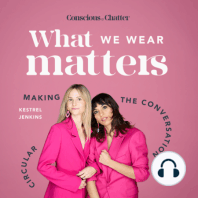40 min listen

Abby Mills (aka @abbyontheinternet) on the de-influencing *trend* & questioning whether this movement can help us combat overconsumption
Abby Mills (aka @abbyontheinternet) on the de-influencing *trend* & questioning whether this movement can help us combat overconsumption
ratings:
Length:
60 minutes
Released:
Mar 21, 2023
Format:
Podcast episode
Description
In episode 291, Kestrel welcomes Abby Mills, aka @abbyontheinternet, to the show. A product designer working in tech in the San Francisco Bay Area, Abby is a style enthusiast, thrifter, beginner sewist, and a slow fashion + sustainability advocate. “If we’re talking about the original definition of de-influencing, I think it’s great that more people are talking about this. There’s a wider conversation that’s happening now, and it’s this newer idea to a more mainstream audience. And I think that a lot of people are craving this conversation. I think there’s a strong response because people are pretty sick of being advertised to — they’re craving the substance, they’re craving this authenticity, they’re craving people with a unique point of view.” -Abby You have most likely heard about this week’s topic – DE-INFLUENCING. It’s something that started trending over on TikTok earlier this year, and has taken on many forms since then. In its origins, it was about becoming more critical about the things that we buy – and it started when a lot of so-called influencers started telling folks what NOT to buy, instead of their typical MO which is to focus on selling us things from their brand partners – things we more often than not, don’t need. This is a refreshing idea – I mean, our feeds are flooded with sponcon these days. Apparently traditional influencer marketing was a $16.4 billion industry last year, and we are becoming increasingly aware of how much we are being marketed to on a constant basis. But while the initial concept of de-influencing is refreshing, it’s definitely not new. There are several *influencers* or *content creators* who have been talking about issues around overconsumption and fast fashion and buying less for years now. Insert writer Aja Barber or creator Heidi Kaluza or drag queen Kimberly Clark – who was doing anti-hauls on YouTube 7 years ago, or this week’s guest – who sometimes calls herself an ex-influencer. Over the last couple of months, we have seen the meaning of de-influencer shift rapidly. It’s gone from being about critiquing our consumerist society to instead, being co-opted by influencers and marketers as an opportunity to share why you shouldn’t buy this product and instead, you should just buy that product! Before we dive deep into all these layers – let’s take a step back and momentarily examine what the origins of the influencer industry were all about. This week’s guest reminds us that the influencer industry was built off of the idea that folks trust the authenticity of everyday people, aka influencers, more than actual brands. But, aren’t we all struggling to trust *influencers* today? Aren’t we regularly overwhelmed with searching for some sort of authenticity, because so much of the content we consume was created, solely because someone was paid to create it? As this week’s guest proposes – if influencers were actually doing their jobs (which includes being truthful and honest with their communities), would the de-influencing trend even exist? If you can’t tell yet, we go down a labyrinth of a rabbit hole with this one – but a lot of the discussion circles back to this primary question — Can de-influencing help us combat overconsumption? Quotes & links from the conversation: “Deinfluencing EXPLAINED Sustainability, Overconsumption, & Deifluencers” — video by Queer Brown Vegan that Kestrel mentions “The new TikTok trend is convincing people not to buy things”, article in The Washington Post that Kestrel mentions “Can Social Media’s New Deinfluencing Trend Really Encourage Us To Buy Less Stuff?”, article in British Vogue by Aditi Mayer that Kestrel mentions Aja Barber — one of the original de-influencers mentioned on the show Heidi Kaluza — one of the original de-influencers mentioned on the show Kimberly Clark — one of the original de-influencers mentioned on the show Mandy Lee — *trend* analyst who has discussed de-influencing (mentioned on the show) “I started to
Released:
Mar 21, 2023
Format:
Podcast episode
Titles in the series (100)
S01 Episode 25 | MINDFULNESS FOR ENTREPRENEURS: MINDFULNESS FOR ENTREPRENEURS by Conscious Chatter